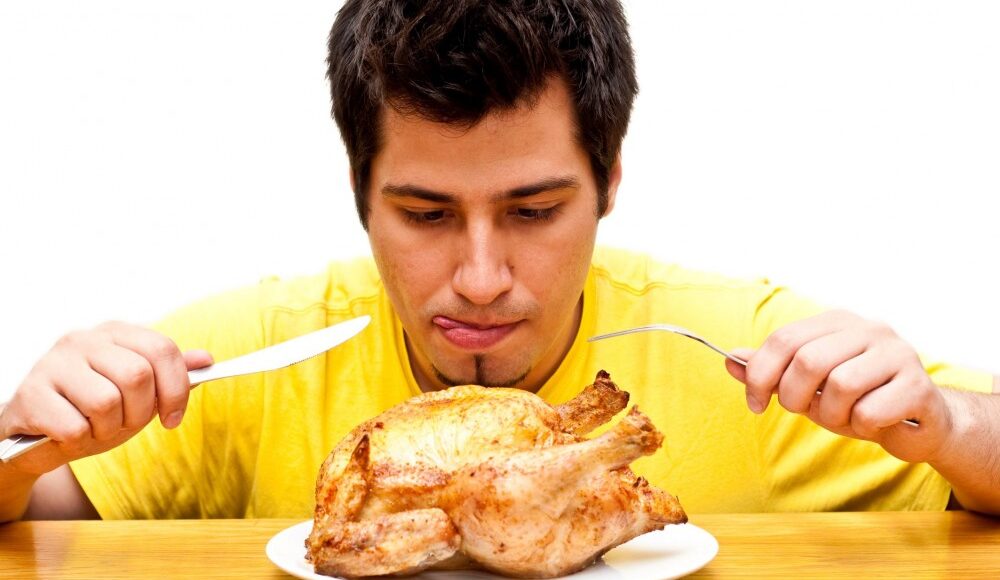
 Dear Virtuous Vegetarian,
Dear Virtuous Vegetarian,
I heard you forgot to pack a lunch today. I just bought a chicken sandwich, but something came up, and I will have to skip lunch. If you don’t eat the chicken sandwich, it’ll just go to waste. What is the more virtuous thing to do?
- Eat the sandwich
- Buy a vegetarian meal
Being a good vegetarian, you probably chose option B. After all, there are many virtuous reasons for renouncing meat, like protecting animal rights, reducing our carbon footprint, and making more efficient use of our food economy. But there’s just one problem. In the scenario above, forgoing the sandwich is not going to revive the chicken, recover carbon waste, or temper the economic demand for meat. To the contrary, compared to purchasing an additional meal, eating the sandwich would actually reduce your carbon footprint and your economic impact.
This hypothetical example illustrates the point that, in industrial societies, the ethical status of how you treat a given animal is much less a factor of what you eat than what you buy. If you think about it, these are separable constructs. For instance, you can buy animal-based food products without eating them. According to the Food and Agriculture Organization of the United Nations (2011), about one third of all food produced is not consumed. This behavior seems egregious, but not because an animal died—that’s a sunk cost because it would have occurred regardless of whether you made the purchase. It’s egregious because suppliers use that consumer purchasing data as a proxy for what you eat, and then they adjust their future supply based on that information. If you don’t eat what you buy, it misleads suppliers into thinking they should increase supply when they shouldn’t.
Of course, such behavior is not just limited to self-described meat-eaters. Many other foods contain animal products: Bagels contain L-cysteine, a poultry product that softens bread; gummy bears contain gelatin, a livestock product that provides a gummy texture; and wine commonly contains isinglass, a fish product for clarifying liquids. Those purchases alert suppliers to an increase in demand, which in turn increases their supply and the supplier’s total environmental impact. As the saying goes, “you vote with your dollar.” In such cases, the greater sin is not in eating the animal; it’s in purchasing an animal-based food product that you don’t eat.
The reverse case is to eat animal products without buying them—let’s call it scavenging. In this case, you’re fulfilling a demand without increasing supply. You’re potentially reaping the benefits of a high-protein meal without imposing costs on the environment or the economy. Indeed, anytime you buy a meal when, for the same level of effort, you could have scavenged, you’re imposing gratuitous harm upon the environment and the economy.
Ok fine, you say, but you can’t expect me to go dumpster diving for other people’s scraps all day. For one, that’s a waste of time, and two, it’s just gross! And I agree. Such practices, sometimes attributed to the “freeganism” movement, raise genuine health and legal concerns, but if that doesn’t deter you, dumpster diving also has a very short time horizon by which the increasing effort you invest in searching for tasty dumpster treats quickly outweighs the intended economic and ethical savings. It’s just not efficient.
When it comes to food waste, the biggest offenders are not consumers but distributors, like grocery stores, school cafeterias, and large corporations. At large scales, organizations can facilitate sanitary and efficient scavenging in a way that private consumers cannot do alone. In order to have the greatest impact, companies that provide food can do a lot more to make their surplus foods more accessible to individuals. Grocery stores often have discount racks. Cafeterias and private corporations, too, could be more proactive and systematic about providing their students and employees with leftovers along with designated pickup hours.
Even so, there are some things you can do as a private individual that don’t involve dumpsters. Last year, my wife, who works for a global corporation, noticed just how much food was going to waste after daily, catered meetings in the corporate office. She began bringing empty Tupperware to work, and coming home with a trunk full of catered meals. At first, people gave her funny looks. But once they heard that we have saved thousands of dollars on groceries and innumerable hours of food prep time, they got in line! We now subscribe to numerous “freegan” information-sharing groups on Facebook and other social media that provide leads to legitimate food distribution sources in our area, serving free and steeply discounted produce, and even sealed hot meals, multiple times a week. Through this process, we have reduced, if only by a small degree, the demand we place on suppliers for estimating their production rate.
Importantly, scavenging is only virtuous if it occurs opportunistically—after the provider has committed to disposing the food—otherwise, it could factor into their future spending decisions and defeat the purpose. But if more people did this sort of opportunistic scavenging, it might make a real difference.
Vegetarianism is gaining increased popularity. And ethically, I love what it stands for. But as a harm-reduction strategy, hardline forms of vegetarianism mistake a problem of financial consumption for a problem of physical consumption. Understood economically, it’s possible to do better for our planet and ourselves by being more discriminating about what we buy than what we eat. This is because the ethical status of buying any meal depends on the other available alternatives. So, when faced with the option to buy a “guilt-free” vegetarian meal or score a leftover chicken sandwich, greater virtue may lie with the opportunistic omnivore.


I appreciate that Eyal Aharoni loves what ethical vegetarianism stands for. Even so, if I were the vegetarian in his office, I would have to decline his offer of the sandwich, even if I would feel a bit sheepish about doing so.
One reason is because there is a benefit to following a strict no-meat rule that the post does not mention. As philosopher Neil Levy has noted, such a rule means we don’t have to make case- by-case judgement calls abut when to eat meat.
I had occasion to summarize Levy’s defence of such a rule in a book review available here: https://digitalcommons.calpoly.edu/cgi/viewcontent.cgi?article=2145&context=bts
Here is the most relevant paragraph:
“Levy defends strict dietary codes by citing psychological research on how we apply behavioural rules. The research suggests that ‘the extent to which rules must be interpreted in order to be applied predicts their liability to encourage self-deception”’ (180). Telling ourselves that we are only going to eat free-range [or freegan] meat requires us to make ongoing judgement calls. To take one of Levy’s examples, ‘should I accept the waiter’s assurance that the pig was slaughtered humanely?’ (180). The science suggests we have a tendency to succumb to temptation in answering such questions. A strict no-meat rule by contrast does a better job managing weakness of will and requires less cognitive labour.”
A second reason not to eat the sandwich is that it is disrespectful to the dead animal. Josh Milburn and Bob Fischer have defended a version of this view. Their paper is not out yet, but a summary of their argument is available here: https://tinyurl.com/y6x9fkty Here again is the most relevant part:
“Fischer and I argue that if many animals can be considered members of mixed political communities, and are thus entitled to certain forms of respect that are extended to (human) community members qua community members, then certain norms around the treatment of corpses should be extended to them. Given that, in most communities, it is considered deeply disrespectful to eat the corpses of dead human community members, the members of those same communities – on Donaldson and Kymlicka’s picture – should consider it deeply disrespectful to eat the corpses of dead non-human community members. Thus, given that meat products are made from (parts of) domesticated animals’ corpses, we have a case against many common freegan practices, including dumpster-diving for canned beef soup and finishing ham sandwiches about to be binned after a meeting. Crucially, this is despite the fact that these freegan practices do not seem to contribute to any animal death or suffering.”
A third possible reason to say no is that my goal is not just to avoid meat myself and leave it there. I also want other people to see that, with rare exceptions, eating animals is morally wrong. I may be more successful at that long-term goal if I avoid retroactively justifying Eyal’s decision to buy the chicken sandwich in the first place. As the post correctly notes, this could encourage someone in his circumstances to do so again in the future. As it hard for me to tell in advance when someone would interpret my acceptance of the sandwich that way, a simple rule against eating it again seems the safest course for someone who wants to reduce harm to animals.
Eyal has done a nice job of tracing the implications of a narrow commitment to harm-reduction; that commitment probably doesn’t entail vegetarianism, but rather opportunistic omnivorism. Nevertheless, I won’t be switching away from vegetarianism. The defense of vegetarianism I’d like to give is a little bit different than Andy’s in comment #1. I’d rather focus on the problem of approaching animals from the narrow perspective of effective altruism:
Harm reduction isn’t the only thing that matters to me. Animals matter, too. I do not want to view chickens as creatures usable as food, and I have practiced that long enough that I no longer view them that way. The thought of eating a chicken is now… disturbing? upsetting? sad? That’s why I would decline the offer of a trash-bound chicken sandwich. Even if I kept in mind that I wasn’t sending any market signals, that would be a profoundly upsetting lunch.
This isn’t a matter of me being irrational about purity, or a picky eater, or whatever. It is, rather, a problem of one common approach of effective altruists. The problem becomes clear to most people when they hear an effective altruist argument that touches on something they personally care about as something other than instruments of harm reduction. Try this similarly structured example. Suppose your partner has suddenly died, and someone suggests that you butcher their body and distribute their meat to hungry people who are willing to eat it. From the standpoint of harm reduction, it’s a peach. But I do no expect you would entertain this harm-reduction strategy, nor should you. It’s GOOD that we do not view our partners as mere cogs in a harm-reduction machine.
This kind of response is hardly new. I’m saying that, given my own commitments with respect to animals, Eyal’s sandwich example functions exactly as Williams’s Jim and George examples do. (That is, I don’t contest the harm-reduction calculus. I just can’t believe that this is the right way to think about animals and my appropriate relationship to them.) Given your commitments to the people you love, the spouse-meat example probably works similarly for you.
I suspect that for many vegetarians who are motivated by love/respect/affection for animals, Eyal’s post will read less as an argument for opportunistic omnivorism than as an “integrity critique” of this approach to effective altruism.
I thank the commentators for caring enough about this complex topic to contribute thoughtful responses. I will respond in brief to just a few of the discussion points.
One claim, as I interpret it, was that we should act as if it’s always wrong to eat meat because it’s too hard for people to consider conditions in which the rule might not apply. This is not a moral argument, but a pragmatic one. One problem with this argument is that it’s not universally true (not to mention, pretty paternalistic). There are many ways in which mere mortals are capable of considering nuanced prescriptive rules (e.g., you should not drive unless you’re at east 16 and have a valid license). Second, ignoring such nuances can cause more harm than good, in the ways I highlighted above. How much harm does a monolithic rule need to cause before we are willing to consider another rule? Surely, the simplest rule is not always the best one.
Another claim was that we should refrain from eating meat as an expression of respect for dead animals. But what does it mean to respect a dead animal? Dead animals are inert objects – and respect, I submit, is a behavior expressed toward sentient beings. I think the burden is on the speaker here to defend a definition of respect that does not rest on superstition.
Another claim was that we should refrain from eating meat because this signals to others that it’s wrong to eat animals. But this argument neglects to justify why it’s always wrong to eat animals in light of my point that the animal is often already deceased. I can appreciate attempts to justify harming and killing animals, but my point is that the act of purchasing meat is often worse, morally, than the act of eating meat. If we wish to invoke a social signaling argument, wouldn’t it then apply at least as well to meat purchases? After all, my argument was that meat purchases send a strong signal to the meat industry. The act of eating meat, on the other hand, is often a private experience with no signal value. The speaker would have to justify why such private consumption is wrong. In my view, the answer is that it’s only wrong when it causes net harm relative to other feasible alternatives. But my point is that there indeed a more harmful alternative.
Another claim was that my argument is inconsistent because if, for instance, my partner had suddenly died, and someone suggests that I butcher their body and distribute their meat to hungry people who are willing to eat it, I would not and should not entertain such a strategy because we should treat other people as ends, not means. Admittedly, I share the speakers visceral emotional reaction to this icky hypothetical, but I reject that reaction as grounds for a good moral principle. My subjective intuitions about the matter, without regard to the balance of social consequences, are not a reliable basis for effective moral principles. Please excuse the graphic nature of this hypothetical, but as my wife herself told me, if her corpse could be used to feed consenting people who are dying of starvation, then, arguably, and holding aside other important factors (like laws against it or family objections), it could be immoral NOT to do so… Or at least it would not necessarily be immoral to do so. I’m not arguing that I personally would go through with it, or if I did, that I would feel great about this state of affairs – I’m just saying that it’s not necessarily immoral to behave in that way; and it might be MORE moral than letting those hungry people starve to death. Moreover, using my partner’s (hypothetical) corpse in this way does not necessarily mean that I view her as a mere cog in a machine. This is because “she” is not her corpse. Corpses, in this view, are not persons. Persons are much more than that, and when a person donates their body to such a use, that is an ultimate heroic and compassionate act, not simply a means to an end. But once deceased, I’ve yet to hear a concrete argument showing what’s necessarily morally wrong with using an (unclaimed, for sake of argument) inert object as a means to a beneficial end.
Thank you for an enjoyable debate, and thanks to my wife who gave me permission to post this unusual comment.